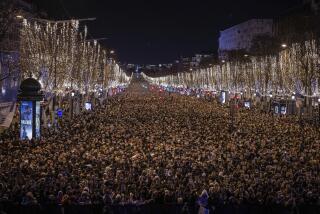U.S.-Soviet New Year’s Eve Party Gets Signals Crossed
SAN FRANCISCO — It’s a good thing that, in the age of electronics at least, New Year’s Day comes twice a year.
That is because a group of about 100 artists, scientists and industrialists from Northern California missed midnight in Moscow on Tuesday. A few of them will get another chance to ring in the new year today.
The group had gathered in a penthouse office here at midday for half of an intercontinental New Year’s party. The other half was being celebrated at the same time--11 p.m. Moscow time--at a popular night club in the Soviet capital.
An inexpensive “videophone” link--using regular telephone lines instead of costly satellite technology--was to join the two parties by television.
It was sublime symbolism. Technology itself would illustrate how technology can--and soon will--be employed to open low-level, person-to-person electronic communications between Typical Joes and Average Ivans.
Only one problem Tuesday: Joe’s phone was busy.
Jammed international telephone circuits in a western Pennsylvania switching center prevented the Soviets from getting through. Mayor Dianne Feinstein got through. A wrong number got through. But Moscow? Nyet.
“I can just see them, shaking their heads and saying to themselves, ‘Those Americans, with their fancy advanced electronics . . . ,’ ” said Joel Schatz of the Ark Communications Institute, a nonprofit organization that hosted the party here as part of its campaign to improve international understanding.
Finally, after 2 1/2 hours of nervously waiting for the phone to ring (and eagerly pleading with operators to clear twin lines that had been reserved), Schatz conceded that his Soviet colleagues were probably asleep and that he would have to try again when they woke up.
He apologized to guests filing out unfulfilled; they would, after all, have to wait for another new year still several hours away. Meanwhile, the engineers planned to return today in case Ivan redialed.
The guests were a colorful cross-section of Northern Californians, from jazz singers Bobby McFerrin and Patti Cathcart to former astronaut Russell (Rusty) Schweickart, and from Nobel laureate Glenn Seaborg to poet Michael McClure.
In Moscow, the guests included Moscow News editor Gennady Gerasimov, comic Arkadi Raikin and space scientist Boris Rauschenbach.
During the half party here, McFerrin, Cathcart and other guests took turns singing, reading and speaking off the cuff, as if their Soviet guests had arrived. Other guests chatted politely while sipping champagne and supping on salad.
Schatz, a computer specialist, said the idea of a joint New Year’s Eve party was brought to him by Soviet scientists during one of his frequent trips to their country, where he often goes to open new lines of communication.
‘Citizen Diplomats’
“It seemed like a really interesting new way to celebrate the New Year and to really put into practice our hopes for a better future,” he said.
It also presented an ideal forum from which to promote the Ark Communication Institute’s support of “citizen diplomats” in both the United States and the Soviet Union. These grass-roots Gladstones would offer a more complete and realistic picture of life in each country than governments can offer.
“The only way I know to foster a normalization of relations between the two governments is to encourage normal relationships between people,” Schatz said.
Several guests who addressed the party testified that their visits to the Soviet Union or their friendships with Soviet citizens here have shown them a new side to the Soviet people.
“It was nice to go,” said 10-year-old Star Rowe, who recently toured the Soviet Union as part of an exchange program, “because it showed me they are just like us, except they have a different language and come from a different place.”
Casual Exchanges
The institute started a personal computer link to the Soviet Union last November for casual exchanges of information between scientists. In the next few months, Schatz said, he hopes to announce several new programs, including an exchange of high school classes.
“Interest in interaction with the West has never been as high since the revolution in 1917,” he said. “We who work there feel an undeniable change has taken place.”
What hasn’t changed, he noted, is the number of telephone circuits between the two countries.
“We have people in Moscow who want to talk to us as much as we want to talk to them,” he said, frowning sheepishly. “It’s ironic that in this age of space travel and supercomputers, such a routine technology can get so overloaded.”
More to Read
Sign up for Essential California
The most important California stories and recommendations in your inbox every morning.
You may occasionally receive promotional content from the Los Angeles Times.










